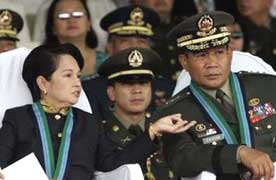ANALYSIS
Two Small Hopes
The report of United
Nations Special Rapporteur Philip Alston on the culpability of the
military in the spate of political killings, and the formation of the
anti-fraud group Kontra-Daya addressed two critical issues confronting the
Arroyo government: its crisis of legitimacy and charges of electoral
fraud; and the gross violations of human rights especially the abhorrent
crimes of political killings and forced disappearances.
BY BENJIE OLIVEROS
Bulatlat
|
On February 21 United
Nations Special Rapporteur on extrajudicial killing, summary or arbitrary
executions, Prof. Philip Alston, came out with a press statement on his
preliminary report. He said the number of killings of leftist activists
and journalists is “distressing”; and that the theory that the killings
were the result of a purge within the Communist Party of the Philippines
and the New People’s Army being “relentlessly pushed” by the military and
government officials were “especially unconvincing”.
|

President Gloria Macapagal-Arroyo
gestures while
talking to AFP chief of staff Lt. Gen. Hermogenes
Esperon, Jr. |
Professor Alston
likened the military to “an alcoholic who denies being addicted to
alcohol.”
After his ten-day
visit to investigate recent political killings and related other
violations of human rights in the
Philippines, Alston came up with
the same conclusion offered by human rights groups and militant
organizations: That the political killings were the handiwork of the
military. Although he came short of declaring that the political killings
were a state policy, he called for a review of the government’s
counterinsurgency strategy.
Alston will submit
his full report to the United Nations Human Rights Council (UNHRC) and the
Philippine government. Nothing may come out of it as the UN does not have
the power to sanction or force a government to do something, unless of
course the government in question is considered by the U.S. as an “enemy”,
which President Gloria Macapagal-Arroyo is definitely not with all the
concessions she has given the U.S. including the custody of the convicted
rapist, U.S. Navy Lance Cpl. Daniel Smith; nor will the Arroyo
administration voluntarily put a stop to the killings.
The significance of
the Alston report is that it adds more international pressure to bear on
the Arroyo administration. It also negated the “purge” theory which the
government uses to mask its culpability in the killings. It laid bare the
Arroyo government’s role in the political killings.
The very next day the
report came out, a group called Kontra Daya (Against Fraud) was launched.
The crowd that attended the launching was small but formidable.
Coordinated by Fr. Joe Dizon, the group included former Vice President
Teofisto Guingona, Bp. Elmer Bolocon of the Ecumenical Bishops Forum, Bp.
Deogracias Iniguez, Sr. May John Mananzan, Dr. Carol Pagaduan-Araullo,
National Artist Dr. Bienvenido Lumbera, Director Carlitos Siguion-Reyna,
Law Dean Pete Agabin, former Solicitor General Frank Chavez, Amado Gat
Inciong, Atty. Oscar Orbos, RC Constantino, Atty. Josefina Lichauco,
Bettina Legarda, Dean Conseulo Paz, Dr. Edelina de la Paz, Dr. Menguita
Padilla, Col. (ret.) Gerry Cunanan, among others. In the crowd was
General Guidani who exposed the participation of the AFP in electoral
fraud in the 2004 elections which precipitated the issuance of Executive
Order No.464. He said they likewise formed an anti-fraud group.
Monitor and expose
Kontra-Daya expressed
its intention to monitor and expose fraud before, during, and after the
May 14 national elections including the use of government resources to
campaign for administration candidates, involvement of military and police
in electoral fraud and violence, vote-padding, vote shaving, vote buying,
disenfranchisement of voters, etc.; to set up a center to receive reports
of electoral fraud; to lead and participate in mobilizations against
electoral fraud; and to coordinate with other groups which are against
electoral fraud.
This group may not
have sufficient resources to monitor 250,000 polling precints and 1,700
Board of Canvassers nationwide. Nevertheless, it offered a venue where the
public can send reports of electoral fraud and constituted a movement of a
broad range of people from different sectors, including the military,
against electoral fraud.
The formation of
Kontra-Daya and the Alston report addressed two critical issues
confronting the Arroyo government: its crisis of legitimacy and charges of
electoral fraud; and the gross violations of human rights especially the
abhorrent crimes of political killings and forced disappearances.
Alston nor the UNHRC
he represents cannot put a stop to the political killings and forced
disappearances. Only the Arroyo government can immediately put a stop to
it, if the government so orders. After all, the Arroyo government boasts
that the AFP chain of command is intact.
Kontra-Daya cannot
prevent electoral fraud from being committed. It can only be stopped by
those who commit it. As Sixto Brillantes put it, “Sino ba ang
nandadaya kundi ang administrasyon? Hindi naman makakapandaya ang
oposisyon.” (Who cheats but the administration? The opposition is not
able to cheat.) Indeed, the opposition does not have the resources and
machinery to cheat on a nationwide scale.
But the Arroyo
government will only do so out of fear of losing what it values most:
foreign aid, loans and investments. And foreign governments are not wont
to withhold these for they do not want to lose the profits they generate
from it. However, the lesson of People Power 1 is clear. Even the U.S.
was forced to withdraw support from the Marcos dictatorship when they saw
that the movement of the Filipino people was strong and formidable.
Bulatlat
BACK TO
TOP ■
PRINTER-FRIENDLY VERSION ■
COMMENT
© 2007 Bulatlat
■
Alipato Publications
Permission is granted to reprint or redistribute this article, provided
its author/s and Bulatlat are properly credited and notified.